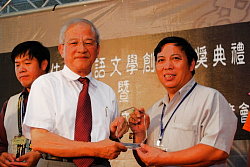Press Conference on the Awards for Literary Creations in Aboriginal Languages and announcement of The Dictionary of the Histories, Languages and Cultures of Taiwan Indigenous Peoples

Among the 107 entries received, 25 were rated "excellent" with another 25 rated "good". The entries fall into one of four categories - New Poems, Essays, Short Stories and Literary Translations. The list of selected entries and information regarding the awards ceremony can be accessed by visiting the website of the Center for Aboriginal Studies, National Chengchi University at http://www.alcd.nccu.edu.tw/.
The authors of the entries strived to make the best use of written aboriginal languages in their literary creations, fully demonstrating the vitality and identity of their languages. In the selection process, a judge for entries in Atayal noted, "The event attracted many entries with 30 in Amis and 23 in Atayal. Many entrants wrote in tribal languages, which are most commendable." A judge for entries in Puyuma indicated, "We used to think it might not be possible for indigenous peoples to write in tribal languages. We are very happy to know that they can write poems and essays, a breakthrough in aboriginal literature."
In order to preserve the written languages of indigenous peoples and encourage them to create literary works using their tribal languages, the Ministry has compiled The Writings of Winning Awards for Literary Creations in Aboriginal Languages from the entries rated "excellent" and "good". The book makes good reference material for promoting the use of aboriginal languages and the teaching of these languages.
In addition, the Ministry of Education and the Council of Indigenous Peoples jointly commissioned The College of Indigenous Studies, National Donghua University to compile The Dictionary of the Histories, Languages and Cultures of Taiwan Indigenous Peoples. The Ministry has taken this opportunity to announce the launch of the Dictionary's Web beta version. The Dictionary's Web version incorporates historical records, stories told by elderly tribesmen, and fieldwork done by cultural workers. It defines key historical, linguistic and cultural terms found in the aboriginal languages. The Dictionary covers a wide range of subjects and is useful for the general public and researchers alike.
The College of Indigenous Studies spent four years to compile the Dictionary, which comprises 15 tribes, 16 subjects - historic events, important figures, organizations and groups, beliefs and rituals, legends and tales, material cultures, peoples flora and fauna, living spaces, customs and traditions, social organizations, legal and political and economic systems, archeological sites, major records, spoken and written languages, arts and cultures, and tribes - and 1,504 entries. Entries in the Tribal Languages section are complete with voice files numbering 1,000.
The Dictionary's Web beta version (http://134.208.27.115/) will be announced on the same day for queries by the general public in an effort to revive and develop aboriginal languages.
Attachment(s) for download
- Chinese textChinese text.doc
